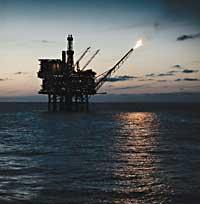Oil Umbrella
The North Sea is a rich area. There, several companies get black gold, oil, but scientists wonder if this activity has environmental repercussions. Legislation requires companies to conduct annual reviews.
In fact, the researchers of the UPV/EHU, responding to the requests of the companies, have analyzed what type of pollutants are expelled in the North Sea and how these affect the inhabitants of the sea. Mussels have been used in these studies.

These invertebrates are used worldwide to measure the environmental quality of the coast, so there is abundant information about the effects of pollutants on them. Therefore, they are also often used for open sea studies, even if they are not residents.
Cage net
The mussels are placed in cages that are then distributed around the platform, usually in two directions.
The first cages are placed near the platform, the following at a distance from the platform and the last, quite far away, as 500, 1.000 and 10.000 meters.
After four or six weeks of cage collection, mussels are examined with biomarkers. Biomarkers are indicators for measuring responses at the molecular and cellular level.
They study whether mussels have accumulated metals and hydrocarbons, if they are stressed, if they have weakened the immune system, if they have suffered damage to reproduction and future generations, etc.
However, the determination of the health status of mussels is not in itself the subject of these investigations. Mussels are used as sentinels as indicators of the health status of the ecosystem. In addition, wild herring and cod from farms have been analyzed due to the complexity of the North Sea ecosystem.
Umbrella effect
However, according to researchers, it is still too early to determine the impact of platforms. However, they have seen that the mussels of the cages closest to the platform hardly suffer changes. In fact, the platform is more affected at a certain distance. This means that substances released from the seabed as a result of oil exploitation emerge in the form of an umbrella, in the form of an open umbrella and upside down.
But that's not all. On many occasions, cages placed on one side of the platform and on the other side do not have the same effect, even if they are at the same distance. Often the umbrella is displaced from the platform due to currents.
However, researchers claim that studies need to be fine-tuned to draw conclusions. Above all, we should consider more parameters and analyze them for longer. To do this, the North Sea is not the ideal place, since the rough sea causes many cages to be lost in those great waters.
- The project is titled Biological Effects of Contaminants in Pelagic Systems (BECPELAG) Water Column Survey (WCS03 WCS04). Objective To evaluate by biomarkers the biological effect of chemical contaminants on pelagic organisms in the high seas. Directed by Ionan Marigomez. Team M. Soto, A. Orbea, I. Cancio, E. Bilbao, B. Zaldibar, N. Alvarado, M.P. Cajaraville. Department of Zoology and Animal Cell Dynamics. Faculty of Science and Technology. Funding Special Initiatives MCYT (2001-02); Statoil (NOR), RF Rogaland Research Stavanger (2003) and Norwegian Institute for Water Research (2004).





